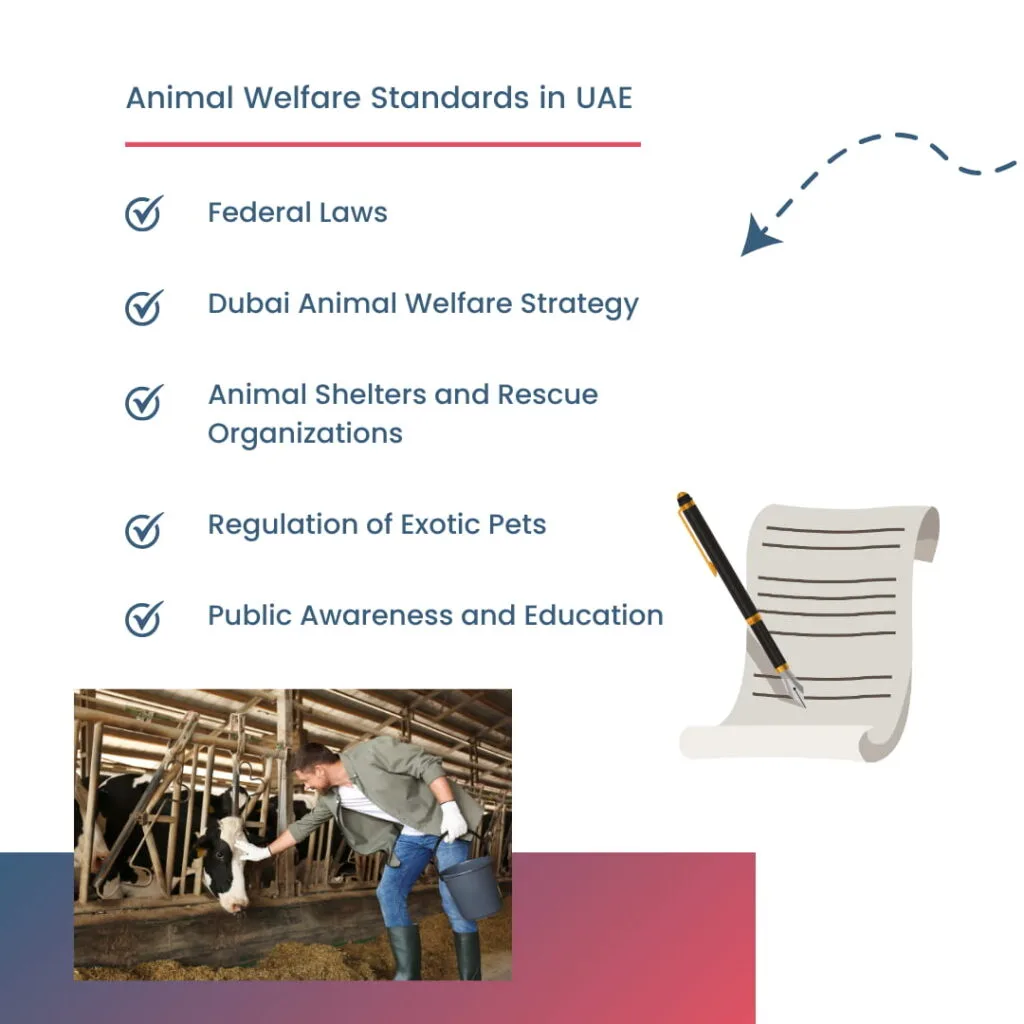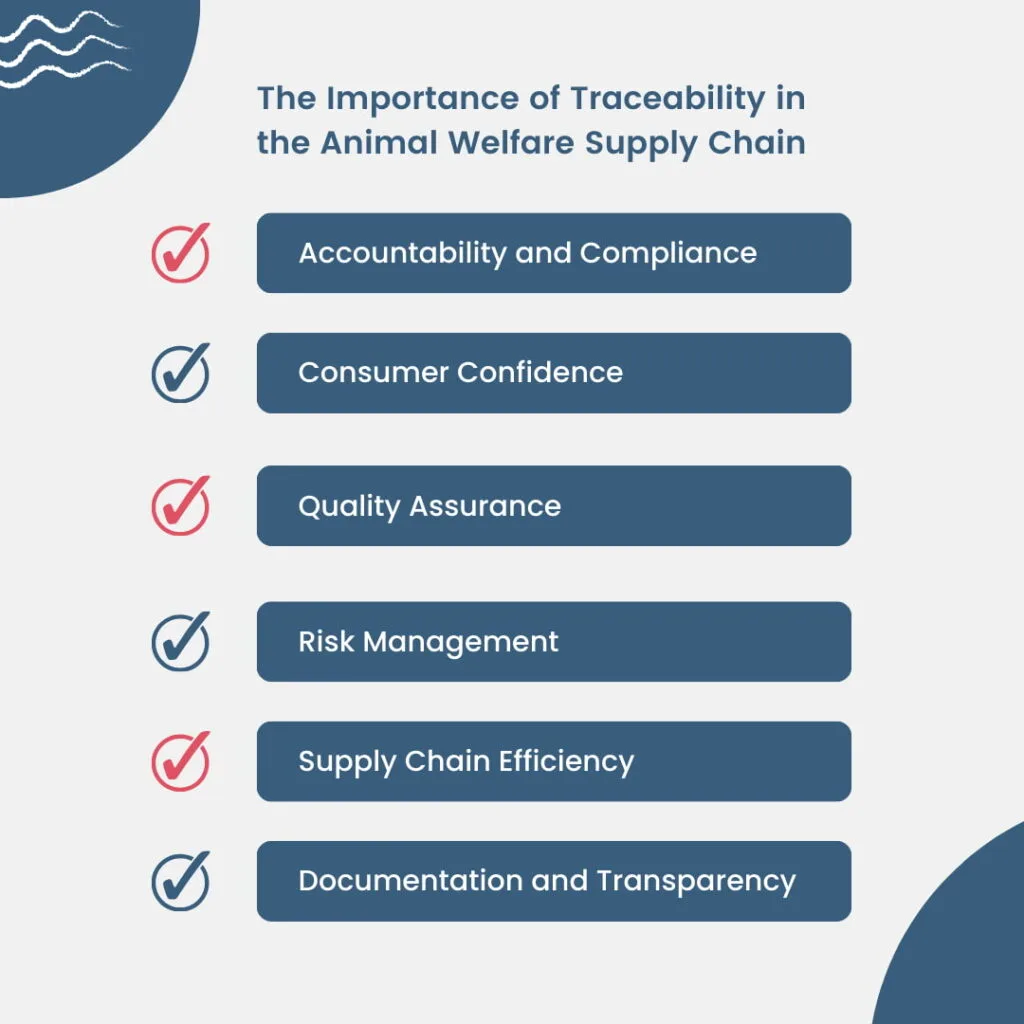Rules and laws for animal welfare standards are crucial in ensuring the proper treatment and health of animals in various situations. A report from the Al Qasimi Foundation shows that more people want pets, either by adopting them or buying products and services for them. But during the pandemic, lots of cats and dogs were given up or left at shelters. As a result, the government has launched various animal welfare initiatives. In this blog, we will take a deeper look into animal welfare standards and traceability in the UAE and the important part played by tracking in the animal welfare supply chain.

Federal Laws
The UAE has made guidelines and laws to guard animals, similar to Federal Law No. 16 of 2007 on Animal Welfare, Federal Law No. 22 of 2016 on the Regulation of Veterinary Quarantine, and Federal Law No. 18 of 2019 on Animal Wellbeing. Federal Law No. 16 of 2007 shows the country’s commitment and lists rules for kind treatment of animals. It also sets punishments for breaking these rules. This law helps make a strong base, defining what’s right and wrong in different areas of life.
Dubai Animal Welfare Strategy
In Dubai, a city known for being creative, there’s a special plan called “Animal Welfare Strategy”. This smart plan includes steps to get people to take care of their pets rightly, manage wild animal groups, and make sure all animals are happy in various situations. Dubai’s promise to use a complete plan shows their forward-thinking way of balancing city growth with nice animal treatment.
Animal Shelters and Rescue Organizations
In 2018, the UAE started a plan called National Animal Welfare Strategy. This aims to make animals live better and feel good. They want people to get pets or breed them right and teach others about treating animals fairly.
The UAE has many animal shelters and rescue groups, doing a lot to help lost or mistreated animals get better and find new homes. These groups are very important to make sure all animals in the country are okay. They follow world-best ways of caring for animals with kind hearts.
Regulation of Exotic Pets
The UAE government knows that keeping wild pets can be dangerous, so it has made rules about who can own them. These rules are made to stop the wrong buying and having of wild animals, helping both pet and foreign animal types be safe.
Public Awareness and Education
Work is being done to let people know about actions for animal care in the UAE. Education programs and campaigns tell people the right way to take care of their pets and how important it is to treat animals with kindness. These efforts help create a kind and caring environment, making the country’s promise to look after animals even stronger.
Principles of Animal Welfare Standards
Five Freedoms Framework
A key part of animal welfare rules are the Five Freedoms, a plan that helps good care. It includes not being hungry or thirsty, feeling safe, not having pain or disease, doing normal actions and not worrying. The UAE’s acceptance of these ideas shows how much they care about the complete health of animals.
Emphasis on Humane Treatment
The basis of keeping animals happy is kind care, focusing on stopping extra pain and boosting good health for them. This idea is seen in the rules of UAE, making sure this country wants to treat animals with care and respect.
Housing and Living Conditions
Rules often look at the right size and conditions of cages or homes for animals. Making sure animals have enough space, a place to stay safe and fun things around them is very important for their all-around health. This aligns with how the UAE cares for animals fully.
Health and Veterinary Care
Good care for sick animals, stopping diseases and quick treatment of illnesses or injuries are basic rules of animal wellbeing. The UAE’s promise to these rules makes sure animals are kept healthy and safe in many areas.
Transportation
Rules for the proper transport of animals, especially farm animals and those used in fun activities, are very important. The UAE’s belief in treating animals well during transport makes its promise to treat all animals fairly even stronger.
Humane Slaughter
For animals that are raised to be eaten, rules for kind killing practices are set. This is so stress and pain can be kept low during the process. This kind way makes sure that even in the last parts of animal care supply chain, fair treatment comes first.
The Importance of Traceability in the Animal Welfare Supply Chain

In today’s world, traceability becomes a very important method to make sure good animal welfare practices in the supply chain. This means finding out where products come from, how they move and are dealt with at every step of the supply chain. This helps make things clear and responsible.
#1. Accountability and Compliance
Using traceability can help with responsibility by discovering where things come from and the methods linked to animal welfare standards. This is very important for making sure that certain needs are met, such as good home life, fair treatment, and correct farming methods.
#2. Consumer Confidence
Building trust from buyers is really important when we are talking about animal welfare in the supply chain. You can make better choices for animals if you learn where your animal products come from. People who care about how we treat animals should do this. Signs that show where things come from become symbols of fair and good treatment. This makes customers feel comfortable.
#3. Quality Assurance
Watching the entire supply chain helps a lot with checking quality, making sure everything is perfect. This means looking after the wellbeing, safety and good care of animals from the farm to processing to giving them away. The tracking system aids in locating and resolving any issues that may arise during production. This ensures that the final products are top-notch and safe to use.
#4. Risk Management
Traceability in animal welfare supply chain is a good way to handle danger. It quickly locates items and where they originate if there’s illness, dirt or other issues like emergencies with food or drinks. Quick action on issues reduces harm to animals and stops sickness or other dangers from spreading.
#5. Supply Chain Efficiency
Keeping an eye on things helps to improve the supply chain by making steps easier and reducing chances of issues. This helps in quicker and more direct responses to issues, lessening their impact on the whole supply chain. By using good tracking systems, we can get a better view of the whole supply chain. This allows us to do our job better and use less stuff.
#6. Documentation and Transparency
Traceability provides a written record of animal products moving in the supply chain. This paper can be used to see rules and display how well animals are looked after. Making things easy to understand helps people, including customers, learn about how animals were raised and the ways used throughout the food chain.
Conclusion
In short, the UAE is a good example for caring about animals’ health and well-being. They combine strong rules with smart thinking to keep their animal welfare top-notch. The effort to treat animals kindly, shown in national laws and big city plans plus the active work of animal shelters, shows how serious this country is about it. Adding traceability raises these standards even more. It makes things clear, accountable, and gives customers trust throughout the animal care supply chain. As we look at animal welfare standards in UAE, farm to plate takes great interest in supporting this initiative by providing technology that is needed to ensure traceability in animal welfare supply chain.
Tanya A Mishra, Technical Content Writer & Marketer at farmtoplate.io (specialising in MENA Tech Landscape). She has been working towards crafting insightful content on topics like Blockchain, Agritech, AI and many more.
